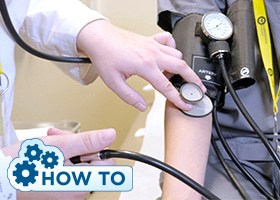 Students interested in a career as a registered nurse or certified medical assistant should be prepared to encounter a wide variety of patients with many different symptoms and complaints. Nurses are most often the first point of contact for incoming patients, and are responsible for intake, recording basic information and pre-screening the patient before they are seen by a doctor. For these reasons, registered nurses need a great deal of patience and passion for forming relationships with their patients, who may return to them with questions about medication or future care.
Students interested in a career as a registered nurse or certified medical assistant should be prepared to encounter a wide variety of patients with many different symptoms and complaints. Nurses are most often the first point of contact for incoming patients, and are responsible for intake, recording basic information and pre-screening the patient before they are seen by a doctor. For these reasons, registered nurses need a great deal of patience and passion for forming relationships with their patients, who may return to them with questions about medication or future care.
More teenagers report symptoms of depression
One group of patients that medical students may not expect to see, but with a population that is on the rise, is teenagers suffering from depression. More studies have been conducted in recent years to determine the causes of depression in teens, and many medical programs offer courses in how to identify symptoms of depression in teens.1 Those pursuing a career in the medical field should be prepared to forge relationships and create a network with mental health professionals so they can refer young patients to a trusted expert in the field of mental health treatment. According to the American Academy of Child and Adolescent Psychology, roughly 5 percent of children and and adolescents in the U.S have suffered from depression at some point in their young lives.1 Children who experience stress at home or school, who have experienced the loss of a loved one, or who have attention, learning, conduct or anxiety disorders are at a much higher risk for depression. Nurses screening teens for depression should also be aware that depression tends to run in families, so more exploration into the patient’s family’s health history may be necessary.
New studies explore various causes of depression in teens
In 2012, a team of scientists in the United Kingdom conducted a study to learn more about the biological causes of depression and anxiety in teens.2 For the teenagers that were at a higher risk for depression due to environmental causes or genetics, the scientists discovered a cognitive biomarker, which is a biological indicator of the risk for depression. The researchers used a simple test to locate the unique cognitive biomarker.2 This test, which can be completed on a computer, could be used in the future as a tool for nurses or medical assistants who meet with the troubled teen. It can screen adolescents for common emotional mental illnesses. Because the cognitive biomarker may appear before any symptoms of depression and anxiety manifest themselves, early intervention can be initiated and issues with depression can be prevented.2 During the study, 15- to 18-year-olds underwent genetic testing and an environmental assessment. The teens were asked to complete a computer test that measured the manner in which they processed emotional information that was provided to them. The participants were asked to determine whether words were positive, negative or neutral.2 The researchers found that teens with a variation of the gene that indicated a biological tendency toward depression, and who had been exposed to family arguments or violence between parents before the age of 6, found it difficult to evaluate the emotions that are normally associated with the words in the test. This difficulty was attributed to their maladjusted insight and response to emotions, as well as their genetic predisposition for depression and anxiety. Scientists concluded that both genes and early childhood experiences contribute to teenagers’ personal thinking styles. This test revealed an inability in some teens to effectively perceive emotion processes, which is a biomarker for low resilience that has been seen to lead to mental illness before any symptoms of depression had revealed themselves.2
Concussions are a major factor in adolescent depression
These findings have inspired scientists to develop inexpensive cognitive tests that doctors, medical assistants and nurses could use to screen adolescents for these illnesses before they become anxious or depressed and need more medical attention.2 However, medical courses offered to students who are interested in working as registered nurses or medical assistants are also exploring different causes of depression besides trauma or genetics. More attention in the news and in schools is being paid to the effects of concussions on teens and how they can cause symptoms of depression.3 Teens that are involved in high-impact sports like football often suffer concussions, sometimes more than one. Concussions can have a long-term effect on memory and cognition, and new research shows that concussions lead to symptoms of depression. According to a new study published in the Journal of Adolescent Health, adolescents with a history of concussive injuries are more than three times as likely to suffer from depression as teens who have never had that type of physical trauma.3 Neurologists are spending more time documenting the link between concussions and depression, but more research is needed to find out why one tends to lead to the other. Medical professionals believe that concussions alter the brain chemistry in some way, resulting in a change in the way the body (and especially the brain) functions.3 More research into the various causes of depression in teens is needed. Medical students have many different career paths they can follow, but a focus on adolescent health would help to further these studies and eventually lead to more preventative care for teenagers at risk for depression. 1 “The Depressed Child,” AACAP.org, July 2013, http://www.aacap.org/AACAP/Families_and_Youth/Facts_for_Families/Facts_for_Families_Pages/The_Depressed_Child_04.aspx 2 Miller, Brooke, “Scientists Discover Biomarker to Screen Teens with Anxiety, Depression,” Science World Report.com, Nov. 29, 2012



